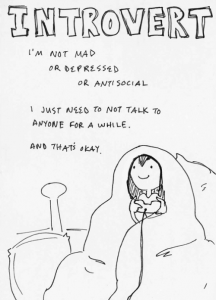
Let me be the first to say that despite what those who know me in real life may think, I’m a classic introvert. I find it draining to be in social situations even though I may enjoy it. I like connecting with people, but more on an intimate one to one level. I have to constantly psych myself up to approach someone new and say hi, especially in a group setting. The scary part is that I’ve gotten so comfortable consciously doing it that I may not even realize when it happens. It is only when I reach home after a full day of interactions which may have been enjoyable, but still find myself exhausted that I have to conclude it takes a lot out of me to be social.
I think I seem extroverted at times because appear unafraid to step out and speak up. It might appear that I do it naturally, but I am not immune to the butterflies, nervous bouts, and anxiety. It is not uncommon for me to start coughing due to nervousness just before going on stage. My trepidation is something I have learned to deal with. Once I am up there, it becomes a lot easier. I’ve always pushed myself this way because I believed being unable to stand up and say something is a sure way of ensuring problems never get addressed, and I dislike not at least TRYING to fix something wrong.
“America had shifted from what the influential cultural historian Warren Susman called a Culture of Character to a Culture of Personality”
“In the Culture of Character, the ideal self was serious, disciplined, and honorable.”
“But when they embraced the Culture of Personality, Americans started to focus on how others perceived them. They became captivated by people who were bold and entertaining. “The social role demanded of all in the new Culture of Personality was that of a performer,” Susman famously wrote. “Every American was to become a performing self.”
Excerpt From: Cain, Susan. “Quiet.” Crown Publishing Group, 2012-01-24. iBooks.
This material may be protected by copyright.
PERSONALITY VS CHARACTER

There are probably some better reads out there that differentiate the two. A simple search yielded results such as this, this and this. One has to do with image and perception of others, whereas the other has to do with beliefs, morals, values and attitudes. Personality has more to do with portrayed charisma, confidence, energy, intellect and passion. Character on the other hand, is harder to discern, and usually surfaces only when a person faces a challenge in life.
This falls within the spectrum of introversion-extroversion where a person may naturally tend towards a certain type of personality. Some are more talkative by nature, and connect well with others very easily. This is no guarantee that the person is honest, virtuous, or has a dependable character. Similarly, some may seem aloof or even indifferent, yet show great depth of character when the situation calls for it. Unfortunately, in our world currently, we tend to psychologically link them together, even though there shouldn’t be a correlation between the two. In the end, whether or not one has an attractive personality, I believe it is more important to understand the underlying motivation, which has to do with values and thus the emphasis on character.
WHAT THIS MEANS TO ME
When identifying personality traits, it is always important to realize that it is never always a “good” or “bad” thing, but rather just different approaches to the way we relate to others. While someone may be introverted, there are times when it is necessary to step out and be bold in interacting with others, and the truth is even introverts crave the connection because we aren’t really meant to be alone. On the other hand, extroverts may find the value in taking some time out and having “alone time” to reflect a little by themselves, and rely a little less on external stimulus.
Understanding my Myers-Briggs personality trait (you can check yours here), I can relate to the fact that different people have different preferences, tendencies, and comfort levels. By understanding the differences, it helps us not to see others only through our own lenses and expectations, but temper it with some tolerance and acceptance because we realize how we are all different individually, and the world is a much better place because of this.
After all, I don’t think I would stand it if everyone were like me.
